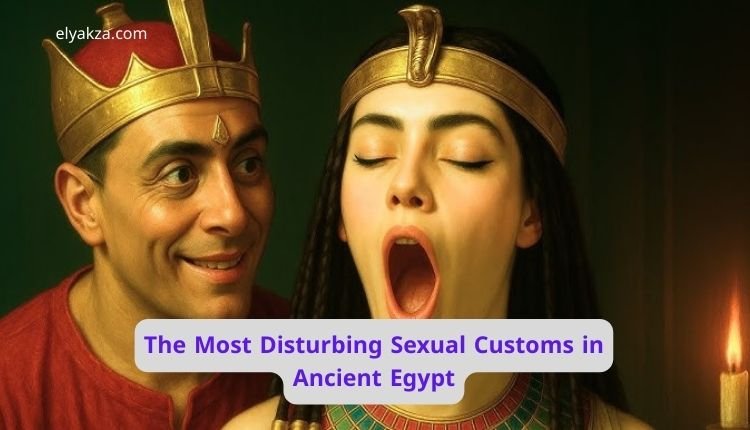Ancient Egypt is renowned for its rich cultural and religious heritage, but beneath its grandeur lies a complex and often unsettling reality. Among the many aspects of this civilization, the sexual customs practiced by its people stand out as particularly controversial. This article delves into “The Most Disturbing Sexual Customs in Ancient Egypt,” exploring how these practices were intertwined with religion and politics, reflecting the intricate social fabric of the time.
قائمة المحتويات
Sexual Customs as Part of Worship
In ancient Egypt, sexual customs were not merely private acts; they were integral to religious worship. The ancient Egyptians believed that sexual activity had cosmic implications, serving as a means of communication with the gods. Rituals often included sexual acts as part of worship, with the belief that such actions could enhance fertility, ensure bountiful harvests, and maintain cosmic order. This intertwining of sexuality and spirituality created a unique cultural landscape where the sacred and the profane were inseparable.
Pressure on Pharaohs
Pharaohs bore an immense burden to demonstrate their sexual prowess. The health and prosperity of the kingdom were thought to hinge on the pharaoh’s ability to perform sacred sexual rites effectively. Any failure in this regard was seen as a cosmic disaster, leading to famine, plague, or invasion. This relentless pressure extended not only to the pharaoh but also to his wives, concubines, and even children, all of whom were expected to participate in rituals that reinforced the divine order.
“Read Also: Unsolved Mysteries and Crimes“
Sexual Rituals in Temples
Some sexual rituals took place in temples, where acts were performed in front of carefully selected witnesses, often from the elite priestly class. These ceremonies were believed to renew the divine order of the universe, and they often involved actual sexual acts rather than mere symbolic representations. Such rituals were laden with religious significance, yet they also raised ethical questions about consent and the exploitation of individuals for the sake of divine favor.
The Role of Children in Sexual Rituals
Children were not exempt from these customs; some were dedicated to temple service from a young age, trained to participate in sacred rites that involved sexual acts. This practice raises profound ethical concerns, as these children were often seen as vessels of the gods, chosen for their purity. However, from a modern perspective, this training can be viewed as a form of systemic abuse, stripping children of their autonomy and subjecting them to the demands of a religious system that prioritized divine service over individual rights.
“Read Also: The Strangest Sexual Practices of Medieval Kings“
Sexual Customs in Daily Life
Sexual customs permeated daily life in ancient Egypt, where sexual activity was often viewed as a natural part of social interaction. However, these customs were also surrounded by strict rules and taboos. While sexual expression was common, it was often shrouded in secrecy, reflecting the tension between public morality and private desires. This duality created a complex social dynamic where sexual behavior could be both celebrated and condemned.
The Impact of Sexual Customs on Society
The sexual customs of ancient Egypt had a profound impact on its society, shaping social hierarchies and political structures. These practices were not merely personal choices; they were embedded in the cultural identity of the civilization. However, they also served as a source of conflict, as the intertwining of sexuality and power often led to exploitation and control over individuals and communities.
The Festival of Hathor
Among the most notorious expressions of sexual customs in ancient Egypt was the festival dedicated to the goddess Hathor. This festival, known for its wild celebrations and sexual excesses, blurred the lines between sacred and profane. Participants engaged in public displays of intimacy, often fueled by alcohol and a sense of divine possession. The festival served as a temporary release from the rigid social hierarchies, allowing individuals to indulge in desires that were typically suppressed.
“Read Also: The World’s Most Dangerous Places“
The Decline of Sexual Customs
As Egypt’s civilization evolved, particularly with the arrival of foreign rulers such as the Greeks and Romans, these sexual customs began to face scrutiny and decline. The Greeks, while fascinated by Egypt’s antiquity, found the open fusion of sexuality and religion unsettling. Similarly, the Romans viewed these practices as barbaric and politically dangerous, leading to a systematic suppression of the old customs. Temples were rededicated, and public festivals stripped of their sexual elements, marking a significant shift in the cultural landscape.
“Read Also: Prominent Unsolved Missing Persons Cases“
Sexual Customs In Ancient Egypt: the Conclusion
The sexual customs of ancient Egypt remain a topic of intrigue and controversy. By examining “The Most Disturbing Sexual Customs in Ancient Egypt,” we gain a deeper understanding of the social and religious dynamics that shaped this civilization. These customs, while often unsettling, reveal the complexities of human behavior and belief, illustrating how deeply intertwined sexuality and spirituality were in the ancient world. As we continue to explore this fascinating aspect of history, we are reminded of the enduring legacy of these practices and their impact on our understanding of ancient cultures.
مها أحمد كاتبة ومدونة تقدم محتوى متنوعًا يجمع بين التجربة الشخصية والتحليل الموضوعي. تكتب عن قضايا اجتماعية وثقافية وفكرية بأسلوب سلس يلامس اهتمامات القارئ اليومية.
تمتاز بأسلوبها العفوي الذي يدمج بين الطابع الشخصي والتعبير الحر، مما يجعل التدوينات قريبة من القارئ وواقعية. كما تحرص على طرح أفكار جديدة ومناقشة قضايا مجتمعية بطريقة مفتوحة للنقاش.
من خلال مدوناتها، تسعى مها أحمد إلى مشاركة الأفكار والخبرات وتبادل الرؤى مع الجمهور، لتجعل من التدوين مساحة للتواصل والإلهام.

